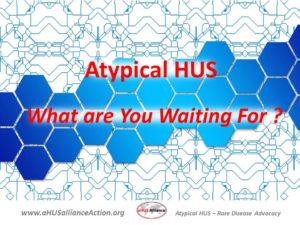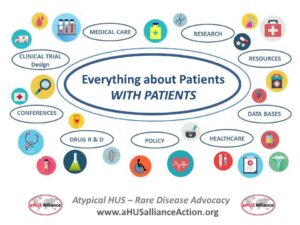
Learning that you or a loved one have been diagnosed with a rare disease like atypical HUS is devastating. Imagine the fear and uncertainty that follows diagnosis when it becomes clear that aHUS affects people differently, and that multiple vital organs could be affected with damage and a severity range that can be wildly unpredictable. As COVID-19 outbreaks impact our world people affected by atypical HUS are confused about what they should or should not do, as well as more specific questions related to aHUS.
Since aHUS is so very rare, it’s only logical that disease-specific resources would be fewer in number than health guidelines and articles meant for the general public. Information about atypical HUS is available, to include resources that are topic-specific (like transplants) and of high interest to many in the aHUS community. Yes, it does take more effort to uncover information about aHUS than it does for more common diseases like diabetes or heart diseases (like CAD). It doesn’t help that the terminology and name variants for this disease make access to research and medical updates even harder to find. Who is going to take the time and effort to keep pace with new research in atypical HUS, and how medical discovery might change treatment and aHUS disease management? That’s something to ponder.
It’s up to all of us, and that includes you. What are you waiting for? Atypical HUS patient groups around the world were started by one or two patients or their families reaching out to others. The aHUS Alliance has an active outreach and support program to assist the development of new national aHUS patient groups. (R.O.W. program) While started with a few aHUS patients or family caregivers, this grew as they connected with medical teams, academics, and researchers to learn more about this rare disease. If knowledge is power, how much effort are you putting into learning about aHUS and by joining with people and aHUS advocacy efforts?
The aHUS Alliance is an informal, at-will group of patient groups and individual advocates who volunteer their time and talents to share aHUS information and assist others. Valuable time may be lost for companies involved in the aHUS space and looking to enroll patients or expand their clinical trials, surveys, and market analysis efforts. Know that currently there’s no global funding for patients interested in international aHUS efforts, so the aHUS Alliance does not have paid office/tech staff or the bandwidth to create databases upon outside request, set up/attend meetings or conferences in various nations, provide translation services for aHUS research or journal articles, or conduct similar business-related functions. When aHUS advocates participate or speak as a ‘Patient Representative’ at a symposium or event, most do so under these circumstances: using vacation days offered by their employer (normally for personal/family use), taking a day off from work with no pay (an economic burden), paying their own travel expenses until reimbursement after the event (or at our own expense), accommodating or adjusting treatment regimes (for themselves or their children regarding infusion dates, dialysis schedules, and specialist appointments/tests). Adult aHUS patients receive requests to participate in phone conferences during their workday, and seems difficult for industry to remember that aHUS health concerns may arise rapidly and cause last minute cancellations. Atypical HUS is a very rare disease, so it’s unrealistic to assume that our small patient population would have much funding ability or the same support given to/by various cancer associations or specific conditions such as Alzheimers. The aHUS community may be small, but together we can use our patient experiences to connect, inform, and collaborate.
National aHUS patient groups and individual advocates within a country can partner with aHUS research teams, clinicians or hospitals, university centers, kidney or rare disease groups, those involved in the study of genetics or complement disease, and many others. The aHUS Alliance highlights atypical HUS issues and efforts around the world, and works to amplify those atypical HUS concerns and patient voices. Not sure where to start? For patients and their families learning about the disease is a critical first step, followed by connecting with a network of advocates interested in atypical HUS not only in your country but globally. Discover what is available for aHUS and other rare disease patients in your nation, in terms of both challenges and resources. Healthcare professionals can use ‘continuing education and development’ opportunities through regional as well as international professional organizations, utilizing the aHUS Alliance network of international aHUS clinician/researchers and our list of aHUS/TMA study centres for their specialized expertise.
There are many common trends and concerns for aHUS families around the world, which we address in aHUS Alliance website articles and outreach. As patients and aHUS family caregivers ourselves, we can & do share atypical HUS research and medical updates. Every case of atypical HUS presents differently in terms of length and severity of aHUS activity, as well as which organs are impacted and to what degree. No aHUS patient or caregiver is qualified to give medical advice to another, so the aHUS Alliance does not – and encourages everyone to contact their own medical team regarding questions about atypical HUS or patient care. Doctors may have highly targeted questions about aHUS diagnosis and disease management, which is why we created our two networks for medical professionals in need of aHUS clinical support.
Here are some of the most common things that aHUS patients and their families are waiting for, which need to be resolved. Perhaps it’s you, maybe it’s others who are also:
- waiting to connect with a local medical specialist, one who is experienced with aHUS treatment and disease management.
- waiting for your family doctor to hand you patient education materials about aHUS, accompanied by a resource list for support and information.
- wishing to start a family, but waiting for more insight into how aHUS genetics might impact the baby, or risks of pregnancy to trigger aHUS activity for the mother.
Perhaps you’ve been waiting for someone to answer these questions, or fix these problems.
* Given the high cost of the 2 drugs approved to treat atypical HUS, are you waiting to find patient assistance programs for eculizumab or Ravulizumab therapeutic drugs?
* Those two drugs are not available in many countries, often due to national policy relating to drug cost versus public healthcare needs, so are you waiting for aHUS drugs to become available in your nation?
* Atypical HUS clinical trials are currently listed for potential new aHUS drugs, so are you waiting for your physician to enroll you in research for new aHUS drugs?
Unfortunately, solutions to such issues are not going to magically disappear by having “someone, somewhere” address them. That “someone” is you, that “somewhere” is in your own backyard. Every country has its own unique approaches to healthcare systems, public policy, and patient resource allocation. Other aHUS patients and families around the world have experienced success in making a difference for themselves and others. It truly is possible for aHUS families to unite within their own nations, to join together with physicians and researchers, and to work with rare, genetic, and kidney disease advocacy groups to change governmental policy in their nation. (See advocacy and aHUSUK) Instead of feeling as if no one is going to solve these things FOR you, focus instead on potential avenues used by medical and research groups (and others) in your nation that might help make progress on such things WITH you.
Change starts with you. What are you waiting for?

Get Started Here! Info & Ideas
How to become a Rare Disease Advocate
Patient Advocacy Pathways:
Telling your Story – Do that & Go Beyond (Part 2 of 4)

Article No. 335
26 March 2020

